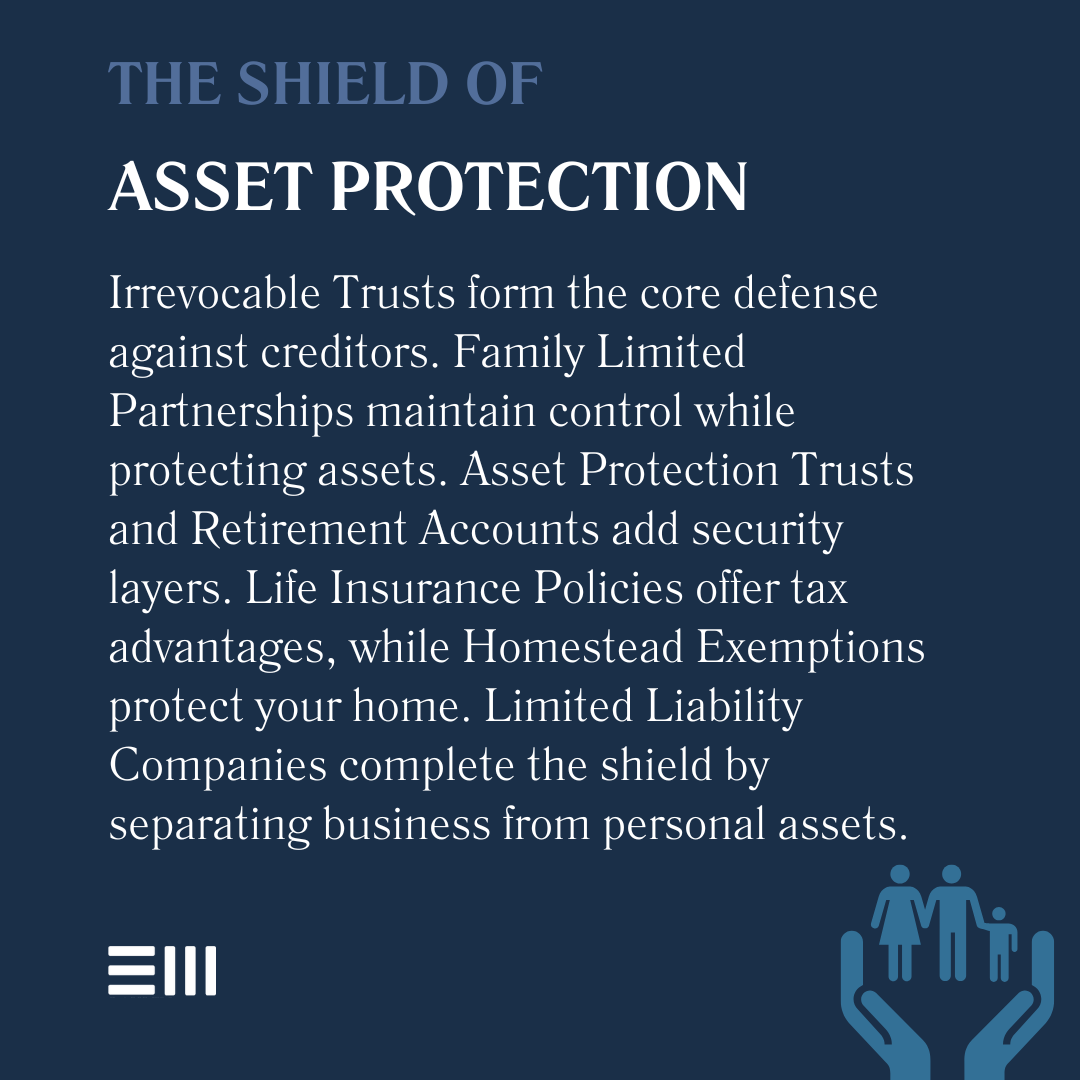A lifetime of hard work can vanish in the blink of an eye.
From unexpected lawsuits to business setbacks, the threats to your family's financial security are real and ever-present.
While many focus on growing their wealth, fewer consider the critical challenge of protecting it.
Much like a fortress requires strong walls before filling its treasury, your estate plan needs robust protection strategies to preserve your legacy for future generations.
Understanding Asset Protection in Estate Planning
The intersection of estate planning and asset protection creates a powerful shield for your wealth.
While estate planning focuses on distributing assets after death, incorporating asset protection strategies helps safeguard your wealth during your lifetime and beyond.
Common Asset Protection Strategies
Before exploring specific strategies, understanding your options helps you make informed decisions about protecting your assets.
- Irrevocable Trusts;
- Family Limited Partnerships;
- Asset Protection Trusts;
- Retirement Accounts;
- Life Insurance Policies;
- Homestead Exemptions; and
- Limited Liability Companies.
Each of these strategies can be customized and combined to create a comprehensive protection plan that meets your specific needs and goals.
Legal Structures for Asset Protection
Different legal structures offer varying levels of protection and flexibility for your assets.
Domestic Asset Protection Trusts (DAPTs)
DAPTs represent one of the most robust asset protection tools available in certain states.
These specialized trusts:
- Protect assets from future creditors;
- Maintain some control over assets;
- Offer tax advantages;
- Provide flexibility in distribution; and
- Allow for modification under certain circumstances.
Understanding these features helps determine if a DAPT aligns with your asset protection goals and family circumstances.
Family Limited Partnerships (FLPs)
FLPs combine business efficiency with asset protection:
- Separate personal and business assets;
- Provide tax benefits;
- Enable gradual wealth transfer;
- Offer liability protection; and
- Allow for centralized management.
These benefits make FLPs particularly valuable for families with significant business or investment holdings seeking both protection and efficient management.
Limited Liability Companies (LLCs)
LLCs serve as effective shields for business and investment assets:
- Protect personal assets from business liabilities;
- Offer tax flexibility;
- Simplify management structure;
- Enable easy transfer of ownership; and
- Provide privacy benefits.
When properly structured and maintained, LLCs provide a robust foundation for both asset protection and business operations.
Advanced Protection Strategies
Beyond basic structures, several advanced strategies can enhance your asset protection plan.
Insurance Solutions
Insurance plays a vital role in comprehensive asset protection:
- Umbrella Insurance Policies;
- Professional Liability Coverage;
- Long-term Care Insurance;
- Life Insurance Trusts; and
- Property and Casualty Insurance.
A well-designed insurance strategy serves as your first line of defense against potential creditor claims and unexpected liabilities.
Retirement Account Protection
Retirement accounts offer built-in protection mechanisms:
- ERISA-qualified Plans;
- Individual Retirement Accounts;
- 401(k) Plans;
- Pension Plans; and
- Social Security Benefits.
These protected accounts form an essential part of your long-term financial security and asset protection strategy.
Frequently Asked Questions
Comprehensive asset protection planning requires careful consideration of various factors. Here are some of the most common questions we encounter from clients seeking to protect their wealth.
What Assets Can Be Protected from Creditors?
Most assets can receive some form of protection, including:
- Real Estate;
- Business Interests;
- Investment Accounts;
- Personal Property;
- Retirement Funds; and
- Insurance Policies.
Understanding these protectable assets helps prioritize your asset protection strategy and allocate resources effectively.
How Does Asset Protection Affect Estate Taxes?
Asset protection strategies often provide tax benefits:
- Gift Tax Advantages;
- Estate Tax Reduction;
- Income Tax Benefits;
- Generation-skipping Transfer Tax Planning; and
- State Tax Considerations.
These tax advantages can significantly enhance the overall effectiveness of your estate planning strategy.
When Should You Start Asset Protection Planning?
Knowing the right time to begin asset protection planning can make all the difference in safeguarding your wealth and future.
- Before Major Life Events;
- During Business Formation;
- While Estate Planning;
- Before Retirement; and
- When Acquiring Significant Assets.
Starting early and planning strategically ensures the maximum effectiveness of your asset protection measures.
How Early Should I Begin Asset Protection Planning?
The best time to start asset protection planning is before any creditor threats arise. Courts may void transfers made after a claim arises as fraudulent conveyances.
What Are the Most Effective Asset Protection Tools?
The effectiveness of protection tools varies based on individual circumstances, but irrevocable trusts, LLCs, and retirement accounts typically offer strong protection.
Can I Still Control My Assets After Protection?
Many asset protection strategies allow for retained control while providing security. The key is finding the right balance between protection and access.
What Assets Cannot Be Protected from Creditors?
Certain assets, like unpaid taxes or child support obligations, cannot be protected from creditors under any circumstances.
How Do I Protect My Home from Creditors?
Homestead exemptions, proper titling, and certain types of trusts can help protect your primary residence from creditors.
Secure Your Legacy Today
Your financial legacy deserves robust protection. Our experienced team specializes in creating comprehensive asset protection strategies tailored to your unique situation.
Contact us today for a confidential consultation and take the first step toward securing your family's financial future.


